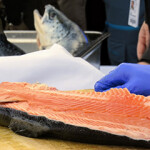New Russian taxes designed to encourage more value-added processing, domestic selling
Russia’s government has introduced a tax reform proposal in order to encourage national fisheries to sell more seafood on the domestic market and export products with more added value.
During a recent session of its Public Industry Council, Russia’s Federal Agency for Fisheries formally introduced a legislative initiative to change the Water Biological Resources (WBR) tax and the practice of its application aimed at getting the country’s seafood industry to alter its business model. The initiative is based on Russian President Vladimir Putin’s formal request to review the tax, made in 2015.
Currently, all fishing companies pay the WBR tax, which is levied on the basis of tonnage of each species caught, with the size of the tax varying by species and fishing region. Most companies now pay only 15 percent of the levy as a measure to stimulate the development of the industry.
In compliance with Putin’s assignment, the new initiative envisages the elimination of the discount, bringing the entire industry up to a 100 percent rate. A transition period will be applied, with 50 percent rates going into effect 1 January, 2020, and the full 100 percent levy being applied as of 1 January, 2022. The tax amounts to be paid per metric ton of each species – which were last increased in 2014 – will also be raised as of 1 January, 2019.
However, some companies will be eligible to keep their current tax exemptions, including those that land their catch at Russian ports to supply their products to Russian consumers, and those exporting seafood with high value-added.
“We don’t see the tax reform as a means to get more money from the industry for the national budget, but as a means to encourage fisheries to sell more on domestic market,” As Ilya Shestakov, head of the Federal Agency for Fisheries, explained.
The Agency’ Industry Public Council approved of the initiative overall, while suggesting a few changes. Exact tax deduction and the specific requirements for qualification are not yet decided and must be further discussed and defined by the Russian government, Shestakov said.
Shestakov confirmed the maximum deduction allowed by the new rules will be 85 percent, which means some companies could continue to pay just 15 percent of the WBR tax.
Photo courtesy of Sputnik






Share